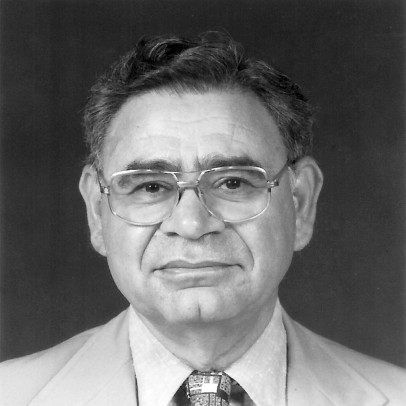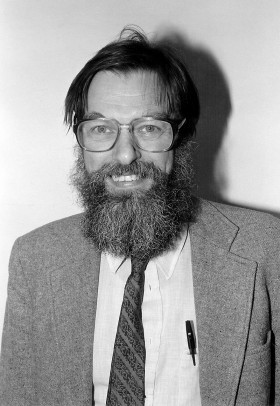Deaths: Riad Barmada, Waud Kracke
Riad Barmada, head of orthopaedics
Riad Barmada, 84, professor emeritus and former head of orthopaedics who worked to bring diversity to a male-dominated field, died Jan. 10.
A memorial ceremony is planned at 10 a.m. March 1 in Student Center West.
Barmada, who retired in 1999, was department head from 1984 to 1998. He remained active in the UI Hospital’s orthopaedic clinic until last year.
“Long before diversity in the workplace became something important to strive for, Dr. Barmada worked quietly to bring women and minorities into orthopaedic surgery, which was a particularly male-dominated specialty in the ’70s,” said Mark Gonzalez, head of orthopaedics who holds a named professorship honoring Barmada.
“He never made a big deal about it, but people noticed. Our orthopaedics department was unusually diverse for the time, and that was to his credit.”
Internationally recognized as an expert on total joint replacement, Barmada was a pioneer in the use of cemented and ceramic total hip replacements. He was one of the first in the Chicago area to use the Charnley total hip replacement and helped promote its widespread adoption.
Both Barmada’s sons went into orthopaedics. Owen Barmada is a physician’s assistant in the department at UIC; Adam is an orthopaedic surgeon at Emanuel Hospital in Portland, Ore.
“We didn’t wind up in orthopaedics because our dad pushed us into it,” Owen Barmada said.
“He supported us in all our endeavors, whatever they were. We just ended up gravitating towards his field.”
“Our dad was very dedicated to UIC and the hospital,” Adam Barmada said.
“He was incredibly supportive of the residents in the orthopaedic program and their educations.”
A native of Syria, Riad Barmada received his medical degree from Syrian University Medical School in Damascus. In the early 1960s, he helped found a medical school in Aleppo where the curriculum was taught in English, so that students could learn from the most current medical literature without having to wait for translations.
Barmada completed a year of general surgery training at Damascus Hospital before coming to Chicago. He completed an internship at Walter Memorial Hospital, followed by an orthopaedic residency at UIC.
He joined the UIC faculty in 1967 and became professor of orthopaedics in 1972. He also held appointments at Michael Reese Hospital, Ravenswood Hospital and the West Side Veterans Administration Hospital.
The author of more than 40 published journal articles, book chapters and abstracts, he was a fellow of the American College of Surgeons, president of the Chicago Committee on Trauma and president of the Illinois Orthopaedic Society.
Contributions can be made to the Riad Barmada, M.D., Orthopaedic Research Fund, UIC College of Medicine Medical Advancement Office, 1747 W. Roosevelt Rd., Chicago, IL 60608.
Waud Kracke, professor of anthropology
Waud Hocking Kracke, 74, an anthropologist who applied psychoanalytic theory to the understanding of culture, died of cancer Dec. 31 in his Chicago home.
A memorial service is planned at 10 a.m. March 14 in 1-470 UIC Library.
Kracke, who joined the UIC faculty in 1970, worked until a few days before his death.
“His students found him an inspirational influence,” said graduate student Dylan Lott, who called Kracke “a devoted and patient teacher who invited students to reconsider thoughts dismissed, or elements forgotten, and to give voice to dawning insight.”
In the 1960s, Kracke did field work in the Brazilian Amazon basin with the indigenous Parintintin. He continued to visit the area throughout his life, working to defend the rights and culture of the tribe and other indigenous peoples and helping to preserve tribal lands.
He was recently honored at the dedication of a new museum in the area, Centro Cultural Parintintin, where he donated his archive of research materials on traditional indigenous beliefs and practices, including recordings of languages no longer spoken.
Kracke enjoyed sharing the cultures he had encountered, Lott said — preparing fried manioc at department potlucks and lamenting the impossibility of obtaining peccary in Chicago.
A graduate of the Chicago Institute for Psychoanalysis, he published a series of papers about the internal lives of people he encountered in his fieldwork.
“Waud Kracke’s extraordinary capacity to invite people to talk about their inner worlds, and his respect for what he heard, gave him access to a depth of psychology that simultaneously reflected a shared humanity and an appreciation of deep difference,” said Robert Galatzer-Levy, a psychiatrist on the faculty at the Chicago Institute for Psychoanalysis.
“His gentle and appreciative attitude combined psychoanalytic and anthropological investigation in a way that allowed others to share his understanding and empathy for people living in what at first appeared to be an alien world.”
Later in his life, Kracke used the same means of respectful inquiry to understand the inner worlds of individuals who are labeled as psychotic, Galatzer-Levy said.
Kracke helped establish the Chicago Circle of the Freudian School of Quebec, an organization working to improve treatment for young adults diagnosed with acute psychosis. He was involved in efforts to open a residential treatment program in the Chicago area for young adults with acute psychotic distress.
Kracke’s honors include two Fulbright Awards.
In addition to his book, Force and Persuasion: Leadership in an Amazonian Society, Kracke wrote more than 40 articles published in books or refereed journals and dozens of encyclopedia articles. He produced a series of films for Encyclopedia Britannica.
Born in Beijing, he grew up in Chicago’s Hyde Park. He received a B.A. from Harvard College, a Ph.D. in anthropology from the University of Chicago, and a certificate from the Chicago Institute for Psychoanalysis for nonclinical psychoanalytic training.
Donations may be made to Cultural Survival, Cambridge, Mass.; the Native American Education Service College, Chicago; or the Chicago Institute for Psychoanalysis.


